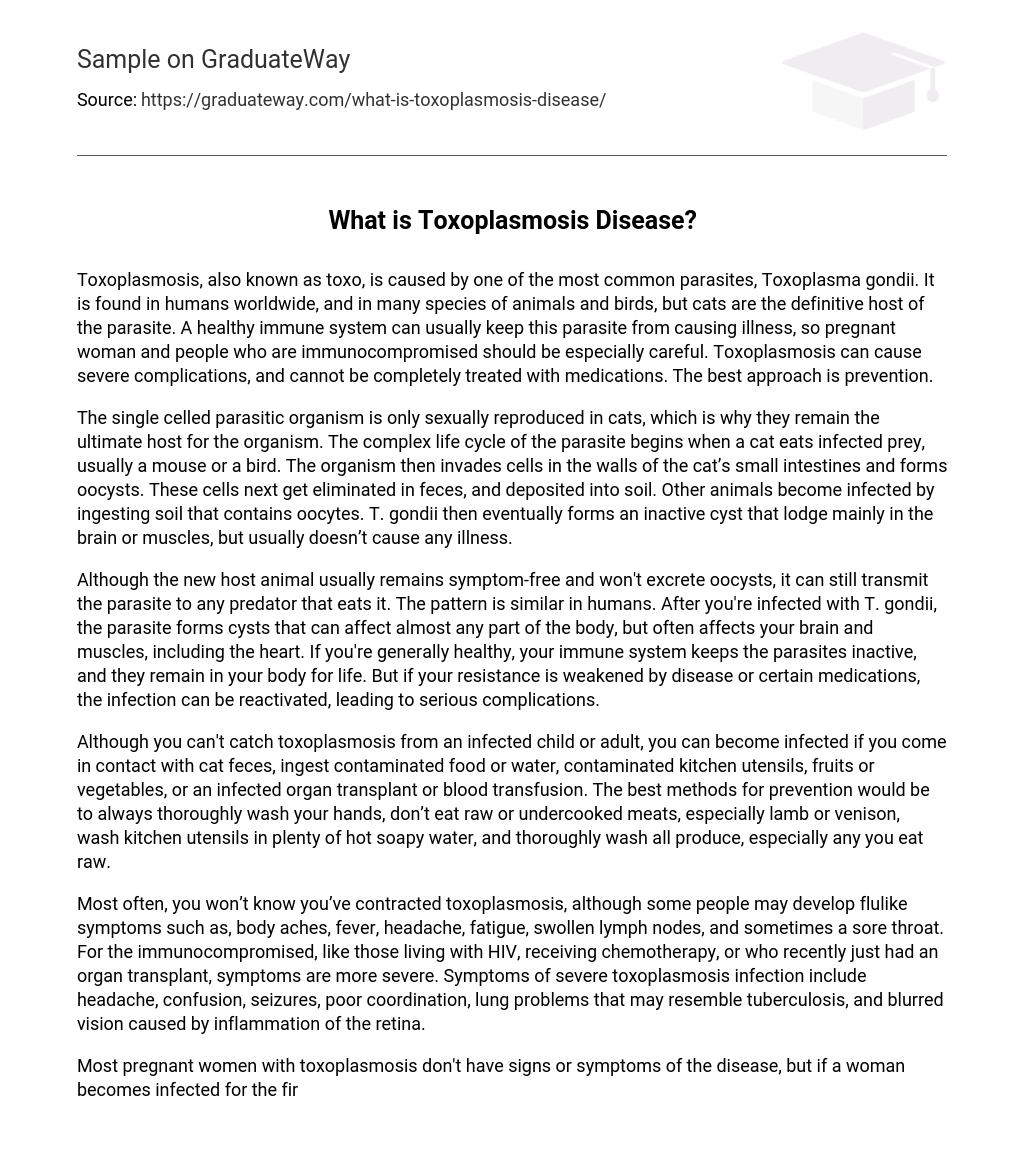Toxoplasmosis, also known as toxo, is caused by one of the most common parasites, Toxoplasma gondii. It is found in humans worldwide, and in many species of animals and birds, but cats are the definitive host of the parasite. A healthy immune system can usually keep this parasite from causing illness, so pregnant woman and people who are immunocompromised should be especially careful. Toxoplasmosis can cause severe complications, and cannot be completely treated with medications. The best approach is prevention.
The single celled parasitic organism is only sexually reproduced in cats, which is why they remain the ultimate host for the organism. The complex life cycle of the parasite begins when a cat eats infected prey, usually a mouse or a bird. The organism then invades cells in the walls of the cat’s small intestines and forms oocysts. These cells next get eliminated in feces, and deposited into soil. Other animals become infected by ingesting soil that contains oocytes. T. gondii then eventually forms an inactive cyst that lodge mainly in the brain or muscles, but usually doesn’t cause any illness.
Although the new host animal usually remains symptom-free and won’t excrete oocysts, it can still transmit the parasite to any predator that eats it. The pattern is similar in humans. After you’re infected with T. gondii, the parasite forms cysts that can affect almost any part of the body, but often affects your brain and muscles, including the heart. If you’re generally healthy, your immune system keeps the parasites inactive, and they remain in your body for life. But if your resistance is weakened by disease or certain medications, the infection can be reactivated, leading to serious complications.
Although you can’t catch toxoplasmosis from an infected child or adult, you can become infected if you come in contact with cat feces, ingest contaminated food or water, contaminated kitchen utensils, fruits or vegetables, or an infected organ transplant or blood transfusion. The best methods for prevention would be to always thoroughly wash your hands, don’t eat raw or undercooked meats, especially lamb or venison, wash kitchen utensils in plenty of hot soapy water, and thoroughly wash all produce, especially any you eat raw.
Most often, you won’t know you’ve contracted toxoplasmosis, although some people may develop flulike symptoms such as, body aches, fever, headache, fatigue, swollen lymph nodes, and sometimes a sore throat. For the immunocompromised, like those living with HIV, receiving chemotherapy, or who recently just had an organ transplant, symptoms are more severe. Symptoms of severe toxoplasmosis infection include headache, confusion, seizures, poor coordination, lung problems that may resemble tuberculosis, and blurred vision caused by inflammation of the retina.
Most pregnant women with toxoplasmosis don’t have signs or symptoms of the disease, but if a woman becomes infected for the first time just before or during the pregnancy, there is about a 30 percent chance of passing the infection to the baby through the placenta. The baby is most at risk of contracting toxoplasmosis if the mother becomes infected in the third trimester and least at risk if she becomes infected during the first trimester.
Many early infections end in stillbirth or miscarriage, and children who do survive are likely to be born with serious problems, such as seizures, severe eye infections, jaundice and an enlarged liver and spleen. Many infected newborns don’t develop signs and symptoms of the disease until they’re in their teens or later. Those signs and symptoms include mental retardation, severe eye infections that lead to blindness and hearing loss. If your doctor suspects you have the infection, you may have several blood tests that check for antibodies to the parasite.
Because these antibody tests can be difficult to interpret, the Centers for Disease Control and Prevention recommends that all positive results be confirmed by a laboratory that specializes in diagnosing toxoplasmosis. A positive result doesn’t necessarily mean you’re actively infected. In many cases, it’s a sign that you were infected at some time in your life and are now immune to the disease. Further tests can help determine when the infection occurred, based on the types of antibodies in your blood, and whether the levels of these antibodies are rising or falling. This is especially important if you’re pregnant or living with HIV.
For pregnant women infected with toxoplasmosis, amniocentesis and ultrasound scans can be done to determine whether the baby is infected as well. For healthy people with signs and symptoms of acute toxoplasmosis, doctors may prescribe Pyrimethamine (Daraprim) and sulfadiazine. For patients with HIV/AIDS, they would be prescribed the same drug regimen, but they would be on it for life. If their CD4 count remains high for at least three to six months the doctor may consider stopping toxo therapy. For pregnant woman infected with toxoplasmosis with out the baby being affected, the doctor may give the antibiotic spiramycin.
Use of this drug can reduce the likelihood that the baby will become infected, without posing a risk to the mother or the child. When tests indicate that the unborn child has toxoplasmosis, the doctor may suggest treatment with pyrimethamine and sulfadiazine. Because these drugs can have serious side effects for both women and babies, they’re normally not used during pregnancy, but doctors sometimes prescribe them in extreme circumstances. Drug treatment can lessen the severity of congenital toxoplasmosis, but it won’t undo any damage that’s already been done.





